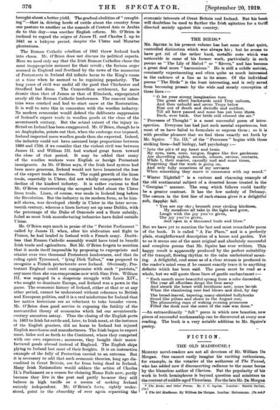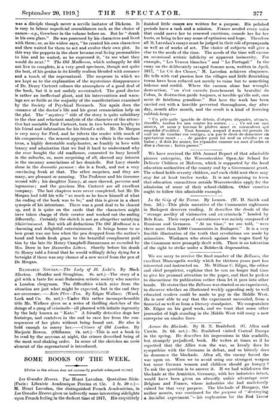FICTION.
THE OLD MADHOUSE'!"
MODERN novel-readers are not all devotees of Mr. William De Morgan. One cannot easily imagine his exciting enthusiasm, for example, in the votaries of the authoress of The Tunnel, who has added new if disconcerting radiance to the name borne by the blameless author of Clarissa. But the popularity of his work in both hemispheres is beyond question and ministers to the content of middle-aged Victorians. For the late Mr. De Morgan The Birds, and Other Poems. By J. C. Squire. London : Martin Seeker,
[2s.]
t The Old Madhouse. By WIZ= De Morgan. landau: Eel em'nu. Bata was a disciple though never a servile imitator of Dickens. It is easy to labour superficial resemblances such as the choice of nameae.g., Grewbeer in the volume before us. But he " drank in his own glass." He was possessed by his characters and lived with them; or, as his widow says, "he created his own characters and then waited for them to act and evolve their own plot. In this way the puppets in the show became real living personalities to him and he waited, as he expressed it, ' to see what they would do next.' " The Old Madhouse, which unhappily he did not live to complete, is a very good specimen, though not quite the best, of his genius in its kindly realism blended with romance and a touch of the supernatural. The suspense in which we are kept as to the explanation of the mysterious disappearance of Dr. Drury Carteret colours the atmosphere of a good deal of the book, but it is not unduly accentuated. The good doctor is rather an ineffectual ghost, and his interventions and warn- : ings are as futile as the majority of the manifestations examined by the Society of Psychical Research. Nor again does the romance of the doctor's life and his great renunciation help on the plot. The " mystery " side of the story is quite subsidiary to the slow and reluctant analysis of the character of the attrac- tive but unstable Fred Carteret, torn in two between loyalty to his friend and infatuation for his friend's wife. Mr. De Morgan is very sorry for Fred, and he infects the reader with much of his compassion ; the nearest approach to a villain is the enchan- tress, a highly detestable scalp-hunter, so frankly in love with luxury and admiration that we find it hard to understand why she ever bought the old madhouse, consented to bury herself in the suburbs, or, most surprising of all, showed any interest in the uncanny associations of her domicile. But Lucy Stands alone in the dramatis person( : she is a freak, and not a very 2onvincing freak at that. The other surprises, and they are many, are pleasant or amusing. The Professor and his tiresome second wife ; his daughter Nancy, at once shrewd, perverse and ingenuous ; and the gracious Mrs. Carteret are all excellent company. The last chapters were never completed, but Mr. De Morgan had told his wife " as much as he knew himself of what the ending of the book was to be," and this is given in a short synopsis of his intentions. There was a good deal to be cleared up, and it is quite orr the cards that the characters might have taken charge of their creator and worked out the ending Efferently. Certainly the sketch is not an altogether satisfying tclaircissement. But with all deductions The Old Madhouse is a charming and delightful entertainment. It brings home to us how great was our loss when the pen dropped from the author's band and lends fresh grace to the beautiful compliment paid him by the late Si Henry Campbell-Bannerman as recorded by Mrs. Drew in her Hawarden Letters. Shortly before his death Sir Henry told a friend that he would willingly delay dying for a fortnight if there was any chance of a new novel from the pen of De Morgan.







































 Previous page
Previous page